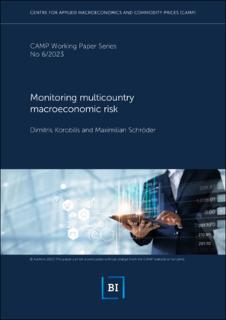| dc.contributor.author | Korobilis, Dimitris | |
| dc.contributor.author | Schröder, Maximilian | |
| dc.date.accessioned | 2023-08-07T16:23:55Z | |
| dc.date.available | 2023-08-07T16:23:55Z | |
| dc.date.issued | 2023-08-03 | |
| dc.identifier.issn | 1892-2198 | |
| dc.identifier.uri | https://hdl.handle.net/11250/3082894 | |
| dc.description.abstract | We propose a multicountry quantile factor augmeneted vector autoregression (QFAVAR) to model heterogeneities both across countries and across characteristics of the distributions of macroeconomic time series. The presence of quantile factors allows for summarizing these two heterogeneities in a parsimonious way. We develop two algorithms for posterior inference that feature varying level of trade-off between estimation precision and computational speed. Using monthly data for the euro area, we establish the good empirical properties of the QFAVAR as a tool for assessing the effects of global shocks on country-level macroeconomic risks. In particular, QFAVAR short-run tail forecasts are more accurate compared to a FAVAR with symmetric Gaussian errors, as well as univariate quantile autoregressions that ignore comovements among quantiles of macroeconomic variables. We also illustrate how quantile impulse response functions and quantile connectedness measures, resulting from the new model, can be used to implement joint risk scenario analysis. | en_US |
| dc.language.iso | eng | en_US |
| dc.publisher | BI Norwegian Business School | en_US |
| dc.relation.ispartofseries | CAMP Working Paper Series;06/2023 | |
| dc.subject | quantile VAR | en_US |
| dc.subject | MCMC | en_US |
| dc.subject | variational Bayes | en_US |
| dc.subject | dynamic factor model | en_US |
| dc.title | Monitoring multicountry macroeconomic risk | en_US |
| dc.type | Working paper | en_US |
| dc.source.pagenumber | 63 | en_US |
